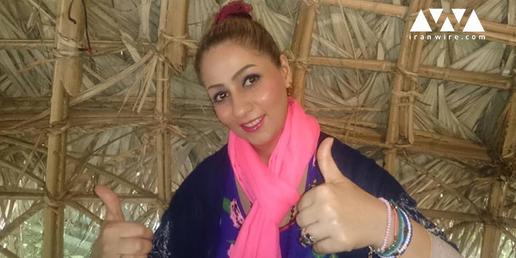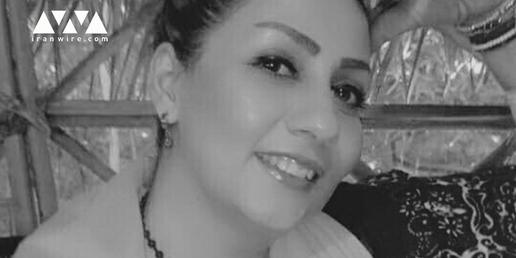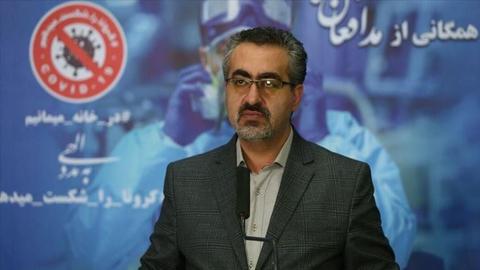Narges Mansouri was one of 14 activists who signed the “Statement of 14,” calling for the resignation of Supreme Leader Ali Khamenei. The call, which came in the form of a public letter, was issued in 2019,10 years on from the Green Revolution and the unrest that followed the disputed presidential election of June that year.
The letter also called for a new constitution to be drafted for the Islamic Republic.
Mansouri is a member of the Syndicate of Tehran and Suburbs Bus Company and the daughter of a veteran of the Iran-Iraq war who died from injuries sustained during the conflict. She was sentenced to six years in prison and a two-year ban on membership to political parties and groups on charges of "collusion and gathering against the security of the country" and "propaganda against the regime.” The sentence was handed down by Judge Iman Afshari at Branch 26 of the Tehan Revolutionary Court.
Eight of the letter’s 14 signatories were women. Shahla Jahanbin, Farangis Mazlum, Fatemeh Sepehri, Zahra Jamali, Giti Pourfazel, Hourieh Farajzade and Shahla Entesari joined Narges Mansouri in signing the statement calling for the Supreme Leader’s resignation. All were arrested and tried.
Mansouri told IranWire she had not committed any crime and that she stood by the statement. She had, she said, exercised her right as a citizen to protest.
Why did you sign the Statement of 14?
I had both union and women's rights experience, and I came to the conclusion that, despite the deplorable state of society, my demands could not be limited to a union or limited to women's rights. I felt what our society needed was national demands for human rights. The statement explicitly stated that, given the current situation, our society had no choice but to transition from the status quo.
Were you aware of the consequences?
Yes, I signed it with knowledge and awareness and knew the regime would be violent. We all thought we had a human duty toward our compatriots, that we had to do something about all the oppression happening around us. We put our names to the public announcement, along with photographs of and details about ourselves. We believed that through this public protest, we would take the fear and terror of making demands away from the people. We would say we are not afraid.
How long after you signed the statement were you detained?
It was August 4 that we released the clip of us signing the statement, and I was arrested on August 10, six days later. Due to the fact I was a member of the Vahed [Bus] Company syndicate and had a known address, they coordinated with the Revolutionary Guards (IRGC) through the Vahed Company’s intelligence section and its managing director. The plainclothes officers came without a warrant, created panic among my colleagues and the local workers, and, while I was talking to my daughter on the phone, they arrested me and took me to an undisclosed location, one of the Guards’ “safe houses.”
Were you forced to make a confession and incriminate yourself?
No, they extracted information, old and new, from our mobile phones and set up a case based on it. They told me in an aggressive manner I had crossed a red line and insulted "Agha" [Supreme Leader Ali Khamenei]. They said we would pay a heavy price for what we had done, and threatened to kill us.
I was at the house the Guards had taken me for three days, and then I was transferred to Ward 2-A at Evin, which is run by the Guards. I was kept in solitary confinement for 20 nights.
The news, especially of your hunger strike, was reported in the media. How did this affect you?
I was detained while I was having a conversation with my daughter, and she was very scared. They did not allow me to call and inform her of what was happening, and I had to go on a hunger strike in order to hear my daughter's voice. My hunger strike lasted 20 days. They threatened to execute me. They said I had not cooperated or expressed remorse. They said I would never hear my daughter's voice again and that I would be sentenced to death. The last day I was in Ward 2-A, I shouted out slogans to the point where I had a heart attack and was bleeding in the stomach. Despite being on a hunger strike, I was transferred to Gharchak Prison in Varamin [south of Tehran] overnight without being sent for medical treatment. Along the way from Evin and Gharchak, they parked the car among the reeds for half an hour and pretended they were going to kill me there. They said no one would notice.
How long were you in Gharchak Prison in Varamin?
Not more than a few days. When I got to Gharchak Prison, I would not stop shouting. I entered the prison shouting, "Death to the dictator!” I saw young girls along the corridor whose eyes glowed with happiness when they saw me shouting. Later, someone told me I was saying what they all felt in their hearts and they were happy that someone had broken the horrendous silence of that place.
The courts there were really courts of injustice. A girl was brought to prison who had been beaten up by an officer for not wearing hijab. In the end, the officer did have to go to court for questioning, and to prison. But still, they demanded 60 million tomans [US$3000] to release the girl.
Did you break your hunger strike in Gharchak Prison?
During my three days in Gharchak, I continued my hunger strike. I think they were afraid of my situation because they asked me to go to the prosecutor's office at the prison and then transferred me to Evin Prison's women's ward. When I arrived at Evin, I was practically unconscious for a week. I was in the prison for about two months, and finally released on bail.
During the trial, did you have the opportunity to defend yourself?
A heavy indictment was issued against me. In political cases, I do not think the judge makes the decisions. The main decision-maker in our case was the Revolutionary Guards. Before I went to the court, the interrogator himself sent me a message through the prisoners who had stood by their positions, saying that because they had done this, he was going to write a note in their files so they will be sentenced to at least 20 years in prison, if not executed. The same threats continued during the trial. He later stated that he was going to make a new accusation against me. The presence of interrogators and the head prosecutor is illegal in court, but they were present in my case. Unfortunately, the IRGC has been given powers so that its forces consider themselves to be above the law and entitled to intervene wherever necessary.
They tried to change the judge's opinion about bail. Even when the judge issued the bail orders, they did not release me that day; they resisted. While my family waited outside the doors of the prison for six hours, they told me, “you should go to the prosecutor's office tomorrow because you were released for one charge, but you are still in prison for the other charge.” When I asked what was going on, I realized that the same interrogator's threat to build and file a new case had been carried out, and they had opened a new case against me so that I could not be easily released on bail.
What was the basis of the new case?
They based the new case on my protests and the slogans I shouted out [while in prison]. When I was in Ward 2-A, they wanted to take a video of us. I protested and said they had no right. I also resisted being forced to wear a veil when they took me to the hospital. The doctors were instructed not to advise that I needed a hospital external to the prison under any circumstances . Due to this second case, at the time of my release, in addition to a 500 million tomans [$25,000] bail, they issued an additional 50 million tomans bond and said that as soon as I took any action, a new case will be reopened and they can arrest me immediately. Anyway, they barely accepted my bail and stipulated that no one [greeting me outside the prison] could bring flowers or sweets. I could not have a welcome party and had to get in the car and leave the prison quickly.
Have you now left Iran?
No, I am still in Iran. I consider my prison sentence unreasonable revenge issued against me just because I did not express remorse.
Has your sentence been implemented?
My sentence was carried out without me receiving a summons. I had to think about my health, considering my illness. The pressures on me have increased dramatically, and after the IRGC wrote a letter to the Vahed Company stating that I had acted against the regime, my salary, benefits, and health insurance were cut off. At the same time, the company is pursuing my official dismissal under pressure from the IRGC Intelligence Unit. Most serious is that they are planning to seize my bail, meaning my mother's apartment.
During the war, people like my father stood up to the enemies of this frontier. For eight years and in those terrible conditions, we did not see our father, and when the war ended, my father was a an injured veteran who suffered illness because of chemical attacks. Eventually, he lost his life pursuing his beliefs. Although they did not declare him a martyr due to their discriminatory considerations, we witnessed my father’s pain and we consider him a martyr.
Fellow signatory Fatemeh Sepehri was the wife of a martyr, and you are the daughter of a martyr. Did those who arrested, interrogated and tried you take this into consideration when they were carrying out their investigations?
Their treatment of us, who incurred losses in the war, was actually much worse. They take no mercy on anyone. Not only Ms. Sepehri, who is the wife of a martyr, but also Mr. Kamal Jafari, the brother of a martyr and veteran, Mr. Abdolrasoul Mortazavi, a veteran and Mr. Mahdavifar, as well as Mr. Mohammad Nourizad and Mr. Khastar, who are well known. They treated us much worse. It was very hard for them to accept that we have turned to criticism and protest.
But I think the world should know that the family of a martyr and the family of a veteran do not necessarily agree with any oppression that occurs in society. I was asked how such a father could bring up such a girl to do such a thing. I said I had actually followed my father's path. My father defended his homeland against a foreign enemy, and I defend my people against a domestic enemy. We have not betrayed our people and their demands. The ones who betray them are the ones who suppress our youth.
I also said at Evin's prosecutor office and in front of the investigator into my case that even if I had one percent doubt about the signing of the statement — which I did not — when I see the inhumane acts of the interrogator and other agents handling my case and hear the news of multi-billion-dollar embezzlers, I become more convinced that I did the right thing, and more determined to fight.
visit the accountability section
In this section of Iran Wire, you can contact the officials and launch your campaign for various problems


























comments